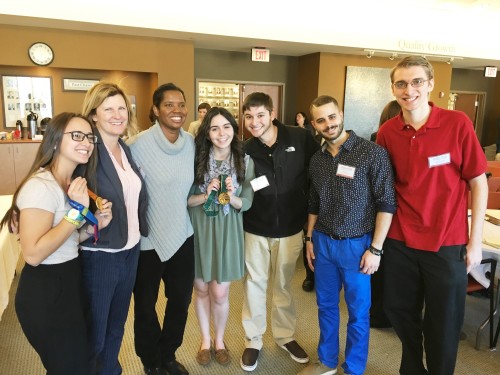
Briana Scurry won two gold medals in her career with the U.S. National Women’s Soccer Team. Photo courtesy of Christina Kirchner.
Seated behind a tiny, worn desk in junior high, a young girl scribbled feverishly across a blank sheet of printer paper in her soon-to-be fully developed handwriting: “Atlanta Olympics, Georgia 1996. I have a dream.” The day the small sign was written, it was hung proudly on her bedroom wall where she could look at it each morning when she awoke and each night before she turned off her lights — a reminder of the goal she hoped to accomplish one day.
In celebration of the 20th anniversary of the 1996 Olympic Games, journalists, students and even executives who helped to plan the event gathered in Atlanta, Georgia on Feb. 19. With the sun beaming down from an endless blue sky on Centennial Olympic Park, time seemed to stand still as the event began — transporting each individual back in time to those incredible games and the honor that being a part of them in even the simplest way had brought them.
Titled “Atlanta, 20 Years Later,” the event promised to share lessons in sports media from the last American Summer Olympic Games. With the keynote speaker being Briana Scurry, it did much more than that. Bringing the games back to life themselves, her words painted an image that only its athletes would have had the opportunity to experience.
With her signage constantly in sight, then-preteen Scurry was certain that she would be at those Olympic Games — she just wasn’t sure about how. At the time, the aspiring athlete had earned spots on her schools’ basketball, track and field and soccer teams — and, while soccer rose to the top of her list, it was the only one not considered an Olympic sport, especially for women.
Regardless of that fact, Scurry continued to pursue her dream and went on to play the sport at University of Massachusetts Amherst, where she was recruited to the women’s All-American team as starting goalkeeper. During one of the most important games of the season, one where scouts from across the country were in attendance, Scurry and her teammates were no match for some of the impressive members of the University of North Carolina team.
Still, despite the difficult loss the team had just faced, the young athlete was among a group of women asked to attend the sport’s National Camp in 1993. While there, Scurry recalled the way she would constantly be scored on and, in turn, felt as though she were not as talented as some of the other women. However, it was her coach who thought otherwise: “We don’t care how many times the ball goes into the net. It’s that you rise up after every goal that is scored and try even harder the next time.”
After attending camp for quite some time, Scurry rose from the fifth most impressive athlete there to the first, and, in turn, would attend the Sweden World Cup in 1995 to prove it. Securing a win there, the goalkeeper soon found out that the fading poster on her bedroom wall that she had written not too long ago would soon “become a reality.”
Before she knew it, Scurry was standing outside the stadium at the opening ceremony of the 1996 Olympic Games with other members of the women’s soccer team. With a sense of nostalgia, the now-retired athlete went on to describe the feeling of entering the stadium for the first time. “Everyone who goes to the Olympics cries,” said Scurry. “Even the 7-foot basketball players are running around like little boys.”
The 1996 Summer Olympics marked the first time that women were invited to compete in the association football (soccer) tournament and, in the final between the United States and China, 76,000 spectators filled the stands. “People couldn’t believe that people would show up for women’s games,” said Scurry. “Those fans came to see us.”
At the end of games which would become known as the year of the women, Scurry and her teammates took home the gold against China in a close match that ended 2-1. Following the win of a lifetime, the team went on to play in the 1999 World Cup where Scurry experienced a movement towards rising numbers in attendance for standalone women’s sports and games.
Towards the top of the hour, Scurry ended by taking a moment to reflect on the past and the promise of the future ahead for women’s sports. That night, women’s U.S. soccer played for the right to punch their ticket to the 2016 Summer Olympics in Rio de Janeiro, Brazil. “The greatest gift is being able to watch the women who were watching me on TV the way I once watched other women on television when I was 8 years old.”
After a round of applause following her presentation, Scurry posed for photographs as well spoke with members of the audience of her inspirational journey despite the hurdles that stood in her way. For some, she even pulled out her two gold medals — one from 1996 and the other from 2004, which she allowed them to hold. “Go ahead, put it on — I’m all about equal opportunity,” said Scurry.


